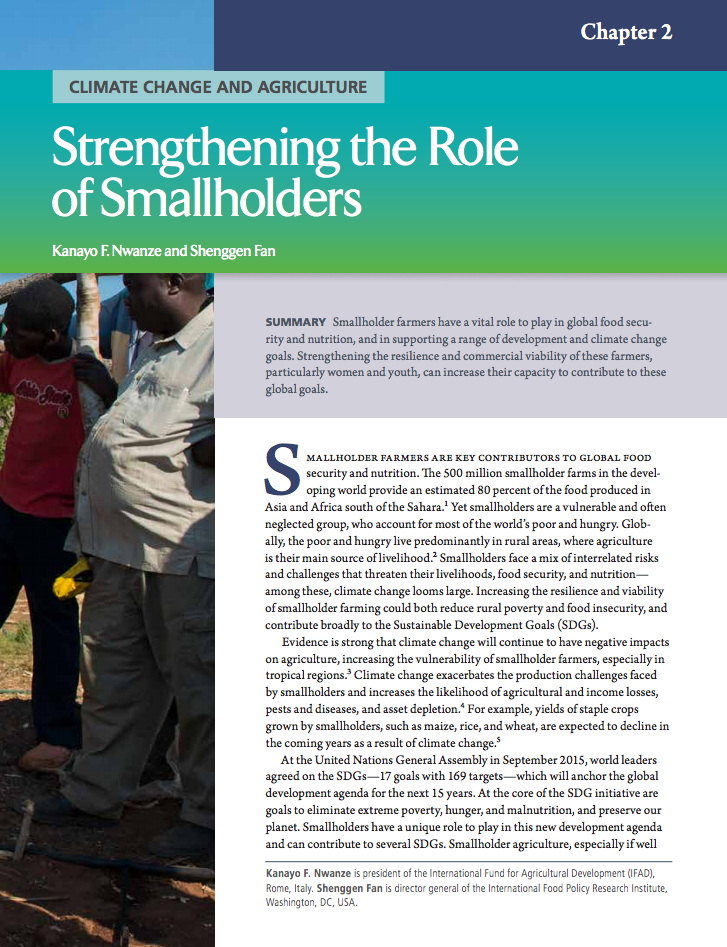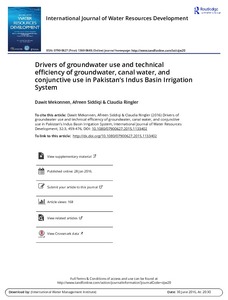Focal point
Location
About IFPRI
The International Food Policy Research Institute (IFPRI) provides research-based policy solutions to sustainably reduce poverty and end hunger and malnutrition in developing countries. Established in 1975, IFPRI currently has more than 500 employees working in over 50 countries. It is a research center of theCGIAR Consortium, a worldwide partnership engaged in agricultural research for development.
Vision and Mission
IFPRI’s vision is a world free of hunger and malnutrition. Its mission is to provide research-based policy solutions that sustainably reduce poverty and end hunger and malnutrition.
What We Do
Research at IFPRI focuses on six strategic areas:
- Ensuring Sustainable Food Production: IFPRI’s research analyzes options for policies, institutions, innovations, and technologies that can advance sustainable food production in a context of resource scarcity, threats to biodiversity, and climate change. READ MORE
- Promoting Healthy Food Systems: IFPRI examines how to improve diet quality and nutrition for the poor, focusing particularly on women and children, and works to create synergies among the three vital components of the food system: agriculture, health, and nutrition. READ MORE
- Improving Markets and Trade: IFPRI’s research focuses on strengthening markets and correcting market failures to enhance the benefits from market participation for small-scale farmers. READ MORE
- Transforming Agriculture: The aim of IFPRI’s research in this area is to improve development strategies to ensure broad-based rural growth and to accelerate the transformation from low-income, rural, agriculture-based economies to high-income, more urbanized, and industrial service-based ones. READ MORE
- Building Resilience: IFPRI’s research explores the causes and impacts of environmental, political, and economic shocks that can affect food security, nutrition, health, and well-being and evaluates interventions designed to enhance resilience at various levels. READ MORE
- Strengthening Institutions and Governance: IFPRI’s research on institutions centers on collective action in management of natural resources and farmer organizations. Its governance-focused research examines the political economy of agricultural policymaking, the degree of state capacity and political will required for achieving economic transformation, and the impacts of different governance arrangements.
Research on gender cuts across all six areas, because understanding the relationships between women and men can illuminate the pathway to sustainable and inclusive economic development.
IFPRI also leads two CGIAR Research Programs (CRPs): Policies, Institutions, and Markets (PIM) andAgriculture for Nutrition and Health (A4NH).
Beyond research, IFPRI’s work includes partnerships, communications, and capacity strengthening. The Institute collaborates with development implementers, public institutions, the private sector, farmers’ organizations, and other partners around the world.
Resources
Displaying 131 - 135 of 1521Climate change and agriculture: Strengthening the role of smallholders
Smallholder farmers have a vital role to play in global food security and nutrition, and in supporting a range of development and climate change goals. Strengthening the resilience and commercial viability of these farmers, particularly women and youth, can increase their capacity to contribute to these global goals.
Drivers of groundwater use and technical efficiency of groundwater, canal water, and conjunctive use in Pakistan’s Indus Basin Irrigation System
This paper explores the major determinants of heavy reliance on groundwater and the extent to which conjunctive use of ground and surface water affects the production efficiency of Pakistan’s irrigators. The results show that the major drivers of groundwater use in Pakistan’s agriculture are the variability and uncertainty associated with surface water delivery and that any effort to address the groundwater–energy nexus challenge should first consider fixing the problems associated with surface water supplies.
Examining gender inequalities in land rights indicators in Asia
This paper reviews the available data on men’s and women’s land rights, identifies what can and cannot be measured by these data, and uses these measures to assess the gaps in the land rights of women and men. Building on the conceptual framework developed in 2014 by Doss et al., we utilize nationally representative individual- and plot-level data from Bangladesh, Tajikistan, Vietnam, and Timor-Leste to calculate five indicators: incidence of ownership by sex; distribution of ownership by sex; and distribution of plots, mean plot size, and distribution of land area, all by sex of owner.
Rural finance and agricultural technology adoption in Ethiopia: does institutional design matter?
Financial cooperatives and microfinance institutions (MFIs) are the two major sources of rural finance in Ethiopia. Whereas MFIs are relatively new, financial cooperatives have existed for centuries in various forms. The coexistence of two different institutions serving the same group of people, and delivering the same financial services, raises several policy questions. Those questions have become particularly relevant, as the government has embarked on developing a new strategy for improving rural financial services delivery.







